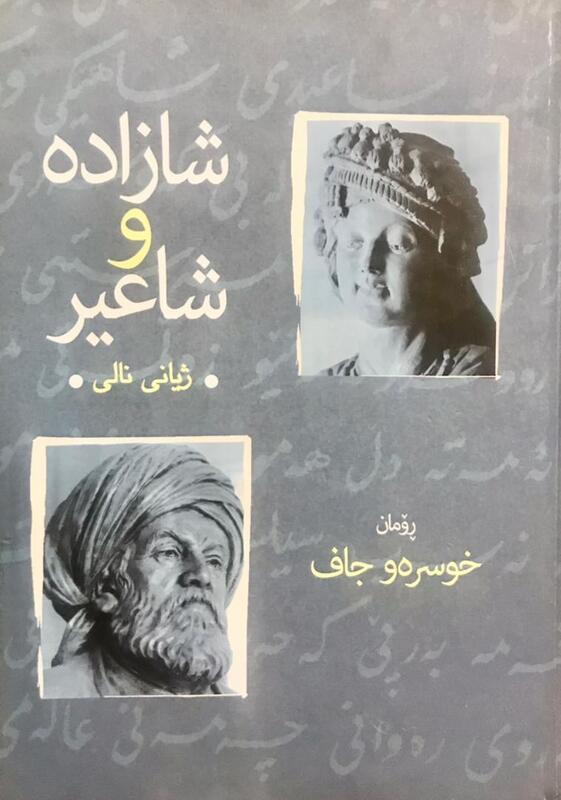The novel “The prince and the poet” by “Khosrow Jaff” is a distinctive work in Kurdish narration. The writer tried to create a historical/non-historical novel. In order to do so he has applied some particular methods. First, he has researched about the character who lived in Istanbul more than hundred and fifty years ago although no family members or friends of his have survived. This has been retailed in the first chapter of the novel artistically. The writer has attempted to create a character of a traveler searching for a missing person. This curious traveler is the narrator of the first chapter. Gradually the narrator reveals that he is looking for any clues about a poet who lived a hundred and fifty years ago in Istanbul named “Mullah Khedri Mikaeeli Shaweisi” known as “Nali”. To narrate this part, the writer creates a substantial atmosphere for the story. He looks for a name that was common in those days, he searches the old books of names that kept the people’s identities in Istanbul, he looks at the newspapers of that time to find any clue about a person and finally, he succeeded.

That part of “The prince and the poet”, a novel by “Khosrow Jaff”, is the most artistic part where the writer creates a sense of suspension and “interruption of meaning”, recreating some of “Nali”’s family members in this city and narrating the modern form of the bureaucratic system of Istanbul that makes the readers eager to keep on reading. On the other hand, the method of narration in this chapter paves the way for the reader to ponder upon the social and bureaucratic system of two hundred years ago in Istanbul and compare it with the modern form of this system in Istanbul and also his own country’s social and bureaucratic system. A system in which both newspapers were a great part of it and the official and governmental systems recorded the dead’s names precisely, too. The reader also finds out about life’s originality in this city to a great deal and the Kurdish people’s position in the past and the present.
This novel reveals another aspect of life in Istanbul for people. It shows this fact that since Istanbul was the capital city of the Ottoman Empire and the Calipha’s throne, it was a city for the intellectuals, thinkers, the exiled ones and so many other people who could not live in their own countries for some reason. One of these people was “Nali Sharazouri” who could not live in his city, Sham and Kurdistan, due to some events that happened to him, and the writer reveals them in the later chapters of this novel and he moved to Istanbul and he visited the Calipha, who was the leader of a great empire and all the Muslims in those days.
Along with this narration, the readers also find out that in such a big city like a metropolitan, the various identities could mix up together undoubtedly. Obviously, such a big city which was the political, intellectual, and religious capital of those days in the Islamic world, was clearly the house of hundreds or maybe thousands of authors, intellectuals, and political or social activists who settled in this city for two reasons.

The first group was those who had migrated for reasons that had happened inside their homelands. The socialists talk about these social-change reasons from social perspectives. They say that the social-change reasons are either “inner/ interior” ones because of which some people who think differently from their society and have a better understanding of various concepts cannot keep on living with the majority of the people, thus they have to make the people change or leave that region and move voluntarily to faraway lands. The second group is those who are forced to abandon their homeland due to other reasons. Those reasons include the elements that exist in a foreign region that takes their attention and interest and can help them follow their ideologies so they choose to leave their motherland and go to those regions that are a utopia for them.
What is getting clear through this narration is that “Nali” as the protagonist of this novel, considered both of these matters significantly. On the one hand, he had to act as a member of a tribal family and had to step into his father’s path and act as the elder of that family and be his brothers’ supporter and keep on doing the migration route of moving to summer camps and moving back. However, he was a man who enjoyed learning and had spent his life traveling through different cities to find good educators. He was so distinct in thinking and ideology that he often was caught in discussions in his educators’ classes because he had chosen a path of his own that no one had stepped into it before and this got comprehensible via those nights when he and his fellow students competed with poems they had written. On such occasions, he faced two groups. One group was loyal to the old school of thought and system and regarded his poems to be written in a scandalous form and wished to isolate him and the other group who were less in number wanted to encourage him and were surprised for his distinctive and initiative writings.
Due to these reasons, Nali had to leave that region and moved to another place that could bear his thoughts and writings. He also wanted to move away from that social condition where he had to take on his family responsibilities.
In “Sham” again Nali faced some other social and political problems that caused him trouble and he underwent many difficulties and disturbances so he had to leave that city, too. These are a part of the problem that belongs to the inside reasons for abandoning a place. However, Nali as a great poet and religious professor had bigger thoughts. Can a great character like Nali who was very knowledgeable and courageous and was such a religious professor who did not think the same way as his temporary fellows, be satisfied with leading the prayers and giving speeches every Friday in the mosques without thinking about any bigger roles that he might be able to have in the society? The answer to this question is already obvious. Someone who was one of the leading characters in the intellectual field of his time had his own writing style and made a new method of writing poetry popular and became very professional in the method himself, someone who could not stand the tribal system of life for himself and his family, was not able to go on living in such a society thus he had to leave it and change this atmosphere to be able to think freely. He did this so that he could feel free of his foes and also be able to think in a less disturbed place. He also needed to learn more than what he had learnt in his own land. He was so wise that he realized he had to move so that he could find out what was beyond the borders for himself. To gain this aim he had to move to Istanbul since it was the right place for him at that time. “Khosrow Jaff” narrates in his novel that Nali had lived in some other big cities before. A part of the novel talks about Nali living in Sine (Sanandaj) and what had happened to him in that city. Another part talks about his life in “Sham” and all the obstacles he had to face there and all those friends whom he happened to know in Sham and the opportunities that he could use. These can all be traced to his later writings. In other parts of this commentary, we will talk about why “The prince and the poet” is different from a historical novel and why this work is an innovative novel more than it is a historical one. We will also take a look at the great Kurdish poet’s life “Mullah Khedri Mikaeeli Shawisi” known as “Nali”.









